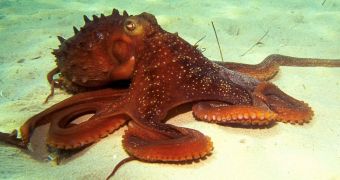Here's an idea for a really cool horror movie that would put “Sharknado” to shame: “Octopus Arms Gone Haywire.” I'm no cinema expert, so the title might not be entirely without fault.
Still, it's the idea behind it that matters.
It turns out that the arms of an octopus can “think” for themselves. Thus, the animal's brain cannot exert complete control over them.
Wildlife researchers say this is because, unlike other creatures, octopi carry about two thirds of their neurons in their arms.
This gives the latter the possibility to react to potential threats and other stimuli without having to wait for the brain to command them to do so, Scientific American explains.
In a paper published in this year's September issue of the Journal of Experimental Marine Biology and Ecology, researchers detail how, despite being severed from the rest of the body for about an hour, octopus arms remain responsive.
More precisely, they move away from negative stimuli, i.e. pinches and acidic substances.
“The results demonstrate that the arms are capable of reflex withdrawal to a ‘noxious’ stimulus without reference to the brain,” the researchers reportedly write in their paper.
Sadly, the severed octopus arms used in these experiments weren't coordinated enough to slap the people torturing them in this manner.

 14 DAY TRIAL //
14 DAY TRIAL //